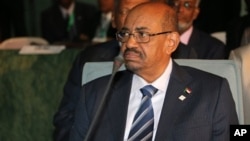Sudanese President Omar al-Bashir was on the road again last week, attending an African Union conference on HIV/AIDS, despite an International Criminal Court arrest warrant for him on charges of genocide, war crimes and crimes against humanity committed in Darfur.
He and other Sudanese officials are wanted for heinous acts for which there must be accountability. It is serious cause for concern that they not only remain at large, but continue to travel across international borders, including to states that are obliged to arrest him by virtue of their membership in the Court and the Security Council resolution that initiated the case against Bashir in the first place.
Bashir traveled to Abuja, Nigeria, for the first day of a two-day summit of African leaders. He abruptly returned to Khartoum in the face of calls for his arrest.
In the last year, Bashir has traveled unhindered to Chad, Eritrea and Ethiopia as well. The African Union itself voted in 2009 to essentially ignore the court’s warrant for the Sudanese leader. The Nigerian government said the decision to allow him to attend the Abuja conference was in keeping with that vote.
Many more states, including a number of African Union members, have refused to receive Bashir, however. We commend their decisions to stand up against impunity and speak out against his continued travel. We urge all nations to refrain from providing Bashir with political or financial support that enable his continued travels.
The United States strongly supports the international efforts to bring to justice those responsible for genocide, war crimes and crimes against humanity, and we firmly believe that there cannot be lasting peace while impunity prevails. Accountability and peace are inextricably bound together.
He and other Sudanese officials are wanted for heinous acts for which there must be accountability. It is serious cause for concern that they not only remain at large, but continue to travel across international borders, including to states that are obliged to arrest him by virtue of their membership in the Court and the Security Council resolution that initiated the case against Bashir in the first place.
Bashir traveled to Abuja, Nigeria, for the first day of a two-day summit of African leaders. He abruptly returned to Khartoum in the face of calls for his arrest.
In the last year, Bashir has traveled unhindered to Chad, Eritrea and Ethiopia as well. The African Union itself voted in 2009 to essentially ignore the court’s warrant for the Sudanese leader. The Nigerian government said the decision to allow him to attend the Abuja conference was in keeping with that vote.
Many more states, including a number of African Union members, have refused to receive Bashir, however. We commend their decisions to stand up against impunity and speak out against his continued travel. We urge all nations to refrain from providing Bashir with political or financial support that enable his continued travels.
The United States strongly supports the international efforts to bring to justice those responsible for genocide, war crimes and crimes against humanity, and we firmly believe that there cannot be lasting peace while impunity prevails. Accountability and peace are inextricably bound together.






